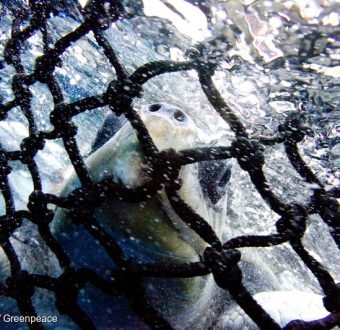The world’s oceans are in trouble, from climate change to destructive fishing and plastic pollution choking marine life. Greedy and irresponsible global fishing fleets are stealing fish from coastal communities and even relying on forced labor to operate fishing vessels. Companies that buy seafood have a responsibility to act.
Foodservice companies are not household names, but they buy and sell tremendous amounts of seafood.
Foodservice companies feed America—every day about half of the money people spend away from home goes to the foodservice industry. These are companies that buy, transport, cook, and serve the food you get at well-known places like Disney World, Burger King, Kennedy Space Center, Yosemite National Park, Florida State University, Hilton Hotels, and the Super Bowl.
How do the companies rank that supply and serve up fried shrimp at Disney World or tuna at Florida State?
Today Greenpeace released Sea of Distress 2017, ranking seafood sustainability among foodservice companies.
Sodexo, Aramark, and Compass Group continue to lead by sourcing more responsible seafood, working to phase out single-use plastic, and advocating for better practices on fishing vessels like avoiding transshipment at sea. Among the twelve companies that failed were foodservice giants Sysco and US Foods. Although several companies improved compared to last year’s ranking, there is significant work needed to truly ensure sustainable, ethical seafood.
This ranking comes on the heels of recent responsible seafood commitments from global tuna giant Thai Union, which provides tuna for several of the companies Greenpeace ranked. If the world’s largest tuna company can take action to tackle problems like transshipment at sea and working conditions on vessels, so too can the biggest foodservice companies in the U.S.
We must hold foodservice companies accountable and demand action for our oceans and worker’s rights.

Greenpeace activists hold up a banner in the hold of a ship engaged in illegal activity.
Help protect the oceans and worker’s rights.
As the equivalent of one garbage truck of plastic is dumped into our oceans every minute each day, global fish stocks decline, and seafood workers continue to be at risk of labor and human rights abuses, companies providing food each day for millions of people must take action. Together, we can call on foodservice companies to do better starting today.
Here’s how:
1. Know the facts. Check out Sea of Distress to see which are the best and worst ranked companies.
2. Join the #BreakFreeFromPlastic movement. Demand that foodservice companies immediately reduce their plastic consumption.
3. Organize. Join Greenpeace Greenwire and ask your local foodservice providers how they are working to stop forced labor, labor abuse, destructive fishing, and protect workers’ rights.
4. Eat less seafood. Reducing seafood consumption now can help lessen the pressure on our oceans, ensuring fish for the future.
5. Vote with your dollar. If you or someone you know eats seafood, use the Seafood Watch app. Only buy green-rated “Best Choice” seafood.







